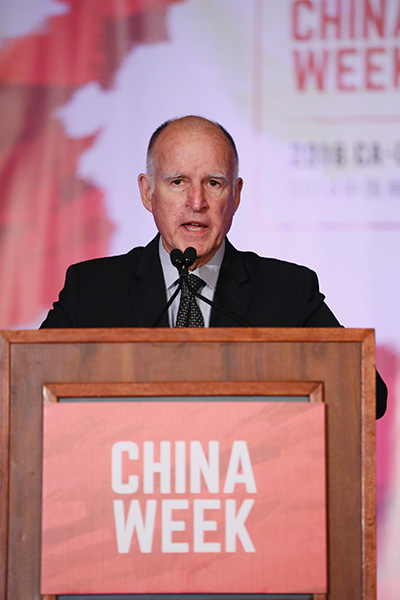California, China work to boost business
By Lia Zhiu in Los Angeles (China Daily) Updated: 2016-05-12 11:03
 |
|
California Governor Jerry Brown speaks at the California-China Business Summit on Wednesday in Los Angeles. Ryan Miller/Capture Imaging for China Week |
China and California, the world's second- and eighth-largest economies, have been working at the sub-national level to seek cooperation in areas such as biotech, clean tech, investment and cross-border e-commerce, to boost bilateral trade and investment.
A Chinese delegation of 130 members, including entrepreneurs and government officials, is visiting California. They attended the California-China Business Summit held on Wednesday in Los Angeles, where they met their US counterparts.
The Chinese economy has slowed down recently and China has reduced purchases, and all sorts of economic problems have been seen in different parts of the world, which illustrates the interdependency that the countries now have, California Governor Jerry Brown told the the summit.
"In a very profound way, human beings are inclusively tied together by their mutual impact based on what they do," he said. "That's a big problem, because we have so many languages and differences. There's no doubt that leaders in Shanghai see the world differently than the leaders in Washington."
But he noted that through gathering together and business arrangements, "we build that connective tissue to slowly bring the world close together".
In the past three years since the framework of China Provinces-US California Joint Working Group on Trade and Investment Cooperation was founded in 2013, Chinese enterprises have invested in more than 300 new projects, almost half of the total Chinese-invested projects in California, Chinese Consul General in Los Angeles Liu Jian told the summit.
China has become the largest trading partner of the United States. By the end of 2015, the United States had invested in 66,000 projects in China, and Chinese direct foreign investment (FDI) in the US had reached $46.6 billion, creating more than 90,000 jobs in the US, according to Liu.
"I want to make sure the China relationship with California works in so many ways because I don't want to minimize the dangers in this world today," said Brown. "People will be affected, either positively or negatively, based on how the China-US relationship unfolds over the coming years."
"For our own prosperity we want China to be prosperous, for our own long-term well-being, we want China to advance in the technologies of reducing greenhouse gases, and develop ways to protect our natural environment," he said.
California, the principal trade gateway between the United States and China, has been a key beneficiary of China's economic growth, not only because of China's major market for the state but also because of its increasing investment, according to a whitepaper by the Milken Institute.
"The most dynamic part of the relationship between the two has been the rise of Chinese FDI in California," the whitepaper said.
California has benefited in a major way, seeing Chinese FDI in the state rise from less than $100 million in 2005 to more than $9 billion in 2015, according to the whitepaper.
North American captures only 5 percent of foreign FDI outflow from China, which means California is well positioned to capture a significant increase of Chinese investment in more sophisticated areas such as technology and real estate development, said Kevin Klowden, executive director of Milken Institute California Center.
At the same time, California also provides excellent opportunities for return on investment. Recent high-profile Chinese investments such as Tencent's acquisition of Riot Games, BYD's bus factory, and Greenland USA's new complex in downtown Los Angeles complement China's growing profile in the technology sector, says the report.
liazhu@chinadailyusa.com







